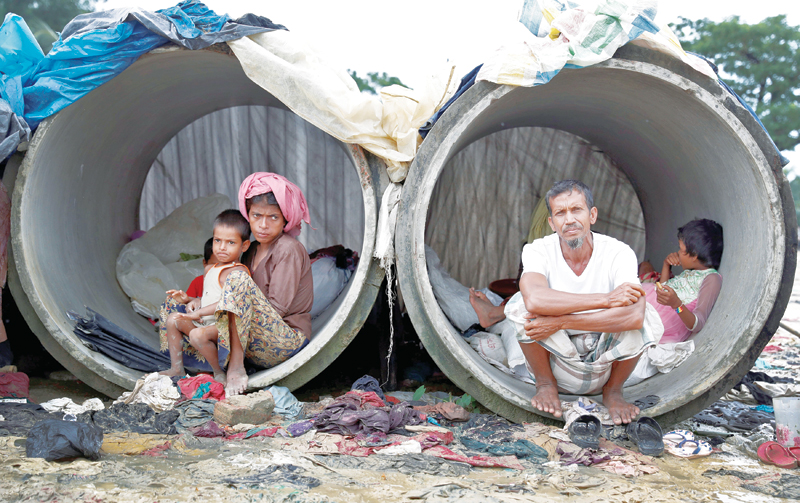

KARACHI: To his foes, Ata Ullah is a reckless amateur who has brought untold misery to hundreds of thousands of Rohingya after launching an insurgency in Myanmar.
But to supporters of the Arakan Rohingya Salvation Army, their leader is an intrepid fighter who left a life of luxury to defend the stateless group against overwhelming odds.
“He’s very charismatic,” Richard Horsey, an independent analyst based in Myanmar, said.
“He inspires people. He speaks in a way that resonates with the grievances felt by the community.”
Ullah is believed to have ordered the deadly attacks by ARSA in Myanmar’s Rakhine state last month, provoking a ferocious offensive by security forces that has sent around 420,000 Rohingya fleeing to Bangladesh.
He first came to public attention last October when he announced his group’s arrival in videos posted online after launching deadly ambushes on Myanmar border posts in Rakhine state, long a hotbed of tensions between the communities.
Multiple sources close to the leader said that Ullah is in his early 30s and appears to oversee a rag-tag network of cells comprising lightly trained men armed with sticks, machetes and a small number of guns.
The vast majority of the world’s Rohingya community have been stateless for decades, eking out hardscrabble lives in ghettos in Myanmar or overcrowded refugee camps in Bangladesh.
But Ullah was raised in a middle class home in the sprawling Pakistani port city of Karachi.
His father studied at the esteemed Darul-Uloom madrassas in Karachi before moving abroad, according to a relative interviewed by AFP.
But after the 2012 communal rioting in Rakhine that displaced over 140,000 mostly Rohingya, Ullah abandoned his comfortable life to go back to Myanmar and fight.
First, he returned to Pakistan with millions of dollars seeking guns, fighters and training from top armed groups, according to militants in Karachi who met him during the trip.
Three figures from militant circles who met Ullah in 2012 in Karachi said money was sent to him via traditional hawala transactions, an informal system of payments based on trust that is far more difficult to trace than bank transfers.
He contacted figures tied to the Afghan and Pakistani Taliban and Kashmiri separatist groups like Lashkar-e-Taiba, offering them large sums of cash in exchange for help, to no avail.
“Publicly, these organisations had expressed their solidarity with the Rohingya but they gave him the cold shoulder,” said one source who collaborated with Ullah in 2012. Most of the militants snubbed or outright ignored the requests, while others stole the money he paid for weapons that were never delivered.
Following the new wave of violence in Rakhine, the same militants who once shunned Ullah have reached out with promises of support for the poorly armed fighters. Sources in contact with Ullah said he has refused their offers, despite ARSA’s dire need for medical supplies and weapons.
“Some of his people have suggested accepting the offers of help but he has shown no interest,” said a source with ties to one of Ullah’s training camps. He fears “that his mission might be hijacked if he involved other armed groups”.
Rohingya Solidarity Organisation’s Pakistan representative Noor Hussain Burmi who met Ullah in 2012 said the insurgent’s vanity and recklessness has brought more misery to the community in Myanmar. “He does not want anyone else to set foot in Rakhine because he thinks they will overshadow him,” Burmi said.
And analysts warn that Ullah’s stated aim of defending Myanmar’s Rohingya has severely backfired. “It’s very difficult to give much credibility to the claim that ARSA is trying to protect the rights of the people,” said Horsey. “It’s provoked the worst crisis for the population probably in its history.” — AFP
Oman Observer is now on the WhatsApp channel. Click here



